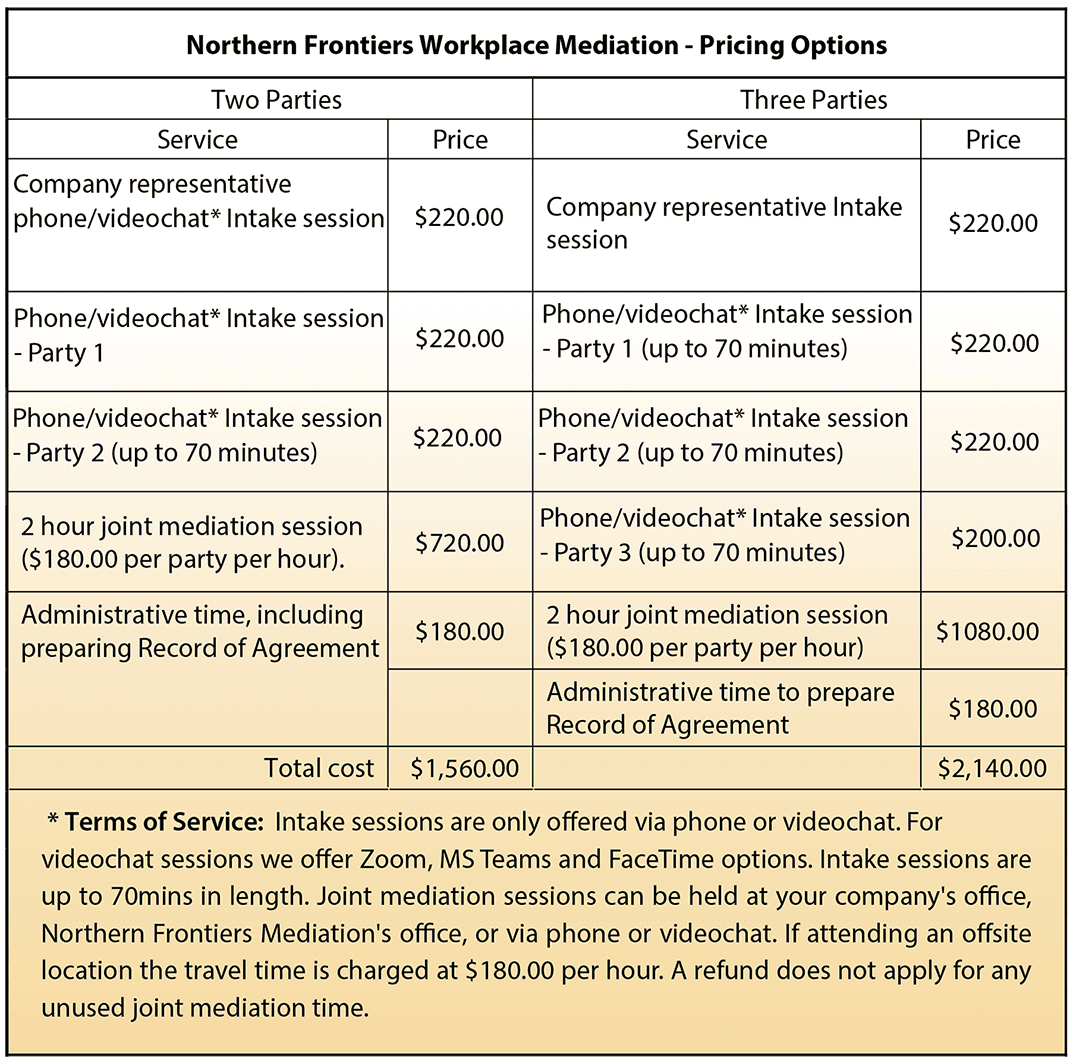Workplace Mediation Cairns & FNQ
At Northern Frontiers Workplace Mediation Cairns our nationally accredited Workplace Mediators use the power of conversation to connect people through active listening, increased awareness of each other’s needs and joint problem-solving.
What Is Workplace Mediation?
Workplace Mediation is a voluntary dispute resolution process managed by an impartial mediator who is external to the organisation. It involves a balanced discussion process in which everyone has a voice. The goal of mediation is to bring people together to explore their issues and brainstorm solutions in a structured way . The Mediator acts as a process guide and sounding board for participants and has no investigative or decision-making power. Workplace Mediation calls for respectful communication and mutual commitment to resolving the dispute. Determining who is right or wrong is not a goal of mediation. The self-determining nature of decisions made in mediation tends to motivate people towards sustained compliance in a way that decisions imposed via formal disciplinary processes may not.
Workplace Conflict Is Common And Not Always A Bad Thing…
Because we’re social creatures we need interaction with other people – and in the workplace the closer we work with others, the more likely we are to experience disagreement. There are basically two kinds of workplace conflict – Healthy and Unhealthy. It’s important for supervisors and managers to recognise the difference.
Unhealthy Conflict…
…is typically born out of a need to win or be right. It’s ego-driven and position-based and is focused on laying blame as opposed to identifying causal factors or improving organisational productivity. Staff are distracted from their core business and morale suffers. Valuable resources are consumed with no positive outcome – problems remain unresolved and colleagues experience ongoing emotional drain and tension. The organisation loses.
Healthy Conflict…
…involves out-of-the-box thinking, discussion and debate. Disputants share a desire to produce a better product or arrive at a better outcome and are open to doing things differently. They work together to find the most appropriate solution and are not afraid to apologise or modify unhelpful behaviours.
Healthy workplace conflict is not ego-driven – its focus is on the issues at hand as opposed to the personal needs/agenda of any individual. It is devoid of personal attacks. Working relationships are therefore protected and strengthened through mutual respect and active listening … everyone stands to benefit through organisational improvement.
Managing Conflict
If you’re a supervisor or manager the first step in managing conflict is to accept its inevitability as part of your role because leadership and conflict are entwined. Look at it as a professional development challenge. The first steps in resolving conflict are understanding its cause and adopting appropriate resolution strategies. Northern Frontiers Cairns’ Workplace Mediation service can assist managers to do this effectively.
What are the benefits of Workplace Mediation?
• Mediation offers an informal, cost-effective way of settling disputes
• Participants are encouraged to take full responsibility for their actions.
• The focus is on how people interact as opposed to who is right or wrong
• Conflict may be ‘nipped in the bud’ before it escalates
• Mediation offers an appealing alternative to formal disciplinary action
• Solutions are generated by participants which means people are more likely to take ownership and comply with any agreement made
• Discussion is guided by the Mediator to ensure respectful, balanced communication between participants
• Workplace productivity can quickly be restored
• Mediation offers a quick turnaround and reduces the likelihood of employees making an external complaint or taking legal action

Types Of Disputes That May Be Suitable For Workplace Mediation
Misunderstandings between individuals from all levels of the organisation
Differing expectations due to conflicting values, beliefs or opinions
Personality differences
Workload distribution
Organisational communication
Staff selection or recruitment processes
Work performance
Leadership style
Organisational planning
Role distinction
Change or restructuring
Some allegations of abuse
- Benefits Of Mediation
- Steps To Mediation
- What If Agreement Is Not Reached?
- Essential Preconditions For Successful Workplace Mediation
- Mediation offers an informal, cost-effective way of settling disputes
- Participants are encouraged to take full responsibility for their actions
- The focus is on how people interact as opposed to who is right or wrong
- The mediation process serves as a guide for improved problem-solving
- Conflict may be ‘nipped in the bud’ before it escalates
- Mediation offers an appealing alternative to formal disciplinary action
- Solutions are generated by participants which means people are more likely to take ownership and comply with any agreement made
- It’s an empowering process
- Discussion is guided by the Mediator to ensure respectful, balanced communication between participants
- Workplace productivity can quickly be restored, relationships healed and work lives enriched
- Mediation offers a quick turnaround and reduces the likelihood of employees making an external complaint or taking legal action
Step 1
Intake and Assessment session – Mediator meets privately with the referee (usually a manager from the company) to determine whether the matter is appropriate for mediation.
Step 2
The Mediator completes individual phone Intake & Assessment sessions with each participant and listens to their viewpoint. The mediation process is outlined along with obligations of the Mediator and participants.
Step 3
The Mediator facilitates a meeting of participants and invites them to share their views/concerns around the issue/s and brainstorm possible solutions. The Mediator acts as a sounding board for participants, offers suggestions and highlights areas of agreement or mutual benefit. The focus is on restoring working relationships, moving forward in unity and resisting the temptation to lay blame or ‘be right’.
Step 4
A mutually acceptable solution may be identified and agreement reached. Any agreements reached can be documented in a Record of Agreement that can be signed by both parties.
Step 5
The Mediator undertakes follow up as agreed with employer.
The Mediator will encourage agreement but will not force it. This is because people tend to buck against decisions that are imposed on them not by them. Mediation is all about people generating their own solutions and jointly selecting that which they can live with. Even when agreement is not reached, the balanced structure of communication during mediation tends to improve working relationships (shared feelings and concerns bond people) and may serve as a guide to future dispute resolution.
Mediation is a viable dispute resolution option under the following conditions: when:
- Participants are willing to talk and freely consent to mediation
- Issue/s raised do not involve serious allegations requiring legal action or a more formal process such as workplace investigation
- Issues raised relate to broader organisational issues more suited to a workplace review process
- Participants are willing to and capable of freely articulating their concerns/needs/position
- There is no significant variance in the negotiating power of disputants
- Participants have the capacity and willingness to self-reflect and modify behaviours that are not conducive to resolution
- Participants are open to new possibilities or different ways of doing things
- The level of conflict is low-moderate – there is no risk to personal safety
- Participants agree to maintain confidentiality
- Participants are invested in resolving the dispute
- The organisation is prepared to provide ongoing support for any agreement made.
Workplace Mediation has long been used by people to resolve disputes. In more recent times it has enjoyed a resurgence of popularity and is viewed by many as the safe, gentle option for managing workplace conflict.
Appointments:
Northern Frontiers Mediation offers appointments from 8.30am weekdays. Out of hours appointments are available on a case-by-case basis. To enquire call 1300 90 81 70, text message via mobile on 0419 531 269, email reception@northernfrontiers.com.au or use the online chat feature at the bottom right of this webpage.
Ready for a new direction?
Contact our Reception and confidentially discuss your unique situation today. Simply call 1300 90 81 70, send a detailed text message to our client mobile on 0419 531 269, email reception@northernfrontiers.com.au or use the online chat feature at the bottom right of this webpage to speak with someone now. Don't worry, there is no obligation to make a booking, and we are happy to answer any questions you have if you are just researching different providers.

Location
75 Digger St
Cairns North QLD 4870
We operate Australia-wide.
We do not accept walk-ins, or individuals without prior bookings. Please contact prior to attending office.
Phone
+1300 90 81 70
Mobile: 0419 531 269 (text messaging available)
LiveChat: If you have any questions about our services and don't have time to ring or email, feel free to use the LiveChat function (bottom right of this page).

Opening Hours
Mon-Fri: 7.30 am – 5:00 pm, by appointment only. Limited face-to-face sessions available during the week. Phone and videochat (MS Teams, Skype, Zoom etc) available each weekday. Last-minute sessions are sometimes available for urgent matters.
Please note: To ensure client confidentiality all bookings are strictly by appointment only therefore we do not accept walk-ins or unannounced requests for service, including for new enquiries.

